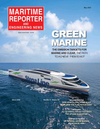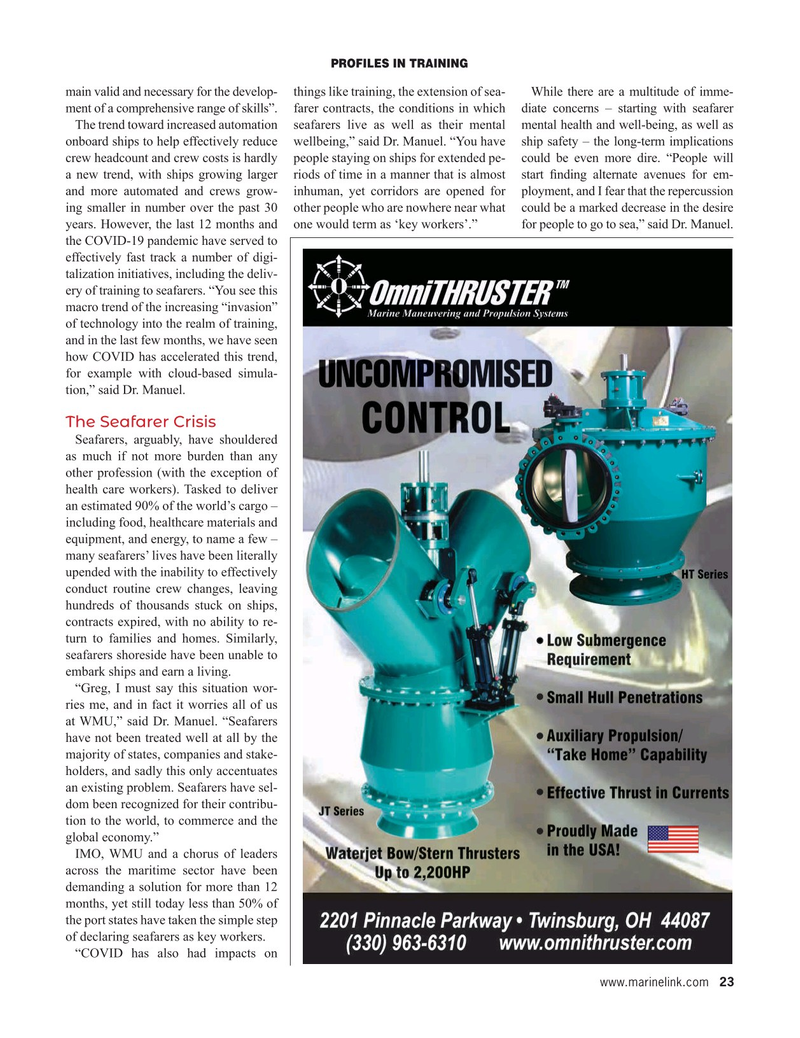
Page 23: of Maritime Reporter Magazine (May 2021)
Green Ship Technologies
Read this page in Pdf, Flash or Html5 edition of May 2021 Maritime Reporter Magazine
PROFILES IN TRAINING main valid and necessary for the develop- things like training, the extension of sea- While there are a multitude of imme- ment of a comprehensive range of skills”. farer contracts, the conditions in which diate concerns – starting with seafarer
The trend toward increased automation seafarers live as well as their mental mental health and well-being, as well as onboard ships to help effectively reduce wellbeing,” said Dr. Manuel. “You have ship safety – the long-term implications crew headcount and crew costs is hardly people staying on ships for extended pe- could be even more dire. “People will a new trend, with ships growing larger riods of time in a manner that is almost start ? nding alternate avenues for em- and more automated and crews grow- inhuman, yet corridors are opened for ployment, and I fear that the repercussion ing smaller in number over the past 30 other people who are nowhere near what could be a marked decrease in the desire years. However, the last 12 months and one would term as ‘key workers’.” for people to go to sea,” said Dr. Manuel.
the COVID-19 pandemic have served to effectively fast track a number of digi- talization initiatives, including the deliv- ery of training to seafarers. “You see this macro trend of the increasing “invasion” of technology into the realm of training, and in the last few months, we have seen how COVID has accelerated this trend, for example with cloud-based simula- tion,” said Dr. Manuel.
The Seafarer Crisis
Seafarers, arguably, have shouldered as much if not more burden than any other profession (with the exception of health care workers). Tasked to deliver an estimated 90% of the world’s cargo – including food, healthcare materials and equipment, and energy, to name a few – many seafarers’ lives have been literally upended with the inability to effectively conduct routine crew changes, leaving hundreds of thousands stuck on ships, contracts expired, with no ability to re- turn to families and homes. Similarly, seafarers shoreside have been unable to embark ships and earn a living.
“Greg, I must say this situation wor- ries me, and in fact it worries all of us at WMU,” said Dr. Manuel. “Seafarers have not been treated well at all by the majority of states, companies and stake- holders, and sadly this only accentuates an existing problem. Seafarers have sel- dom been recognized for their contribu- tion to the world, to commerce and the global economy.”
IMO, WMU and a chorus of leaders across the maritime sector have been demanding a solution for more than 12 months, yet still today less than 50% of the port states have taken the simple step of declaring seafarers as key workers.
“COVID has also had impacts on www.marinelink.com 23
MR #5 (18-33).indd 23 5/7/2021 12:43:05 PM

 22
22

 24
24
